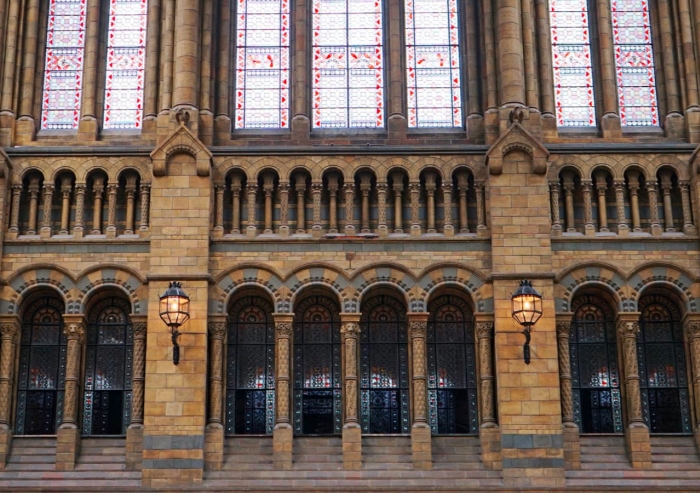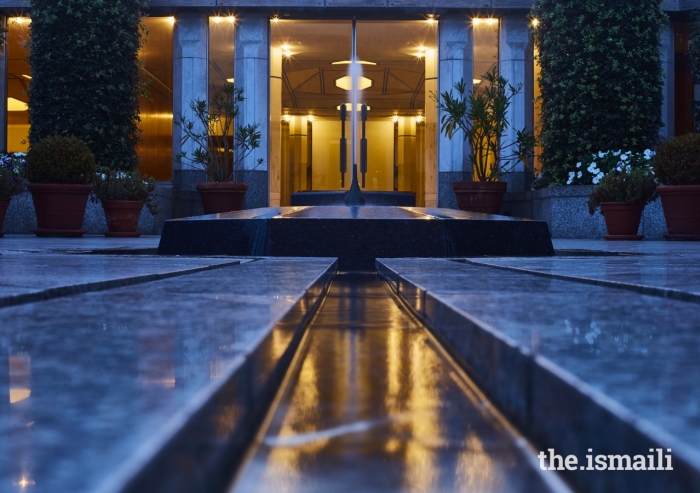| PRESS RELEASE | 24 April 1985 |
MRS THATCHER OPENS ISMAILI CENTRE, LONDON
AGA KHAN CALLS FOR GREATER UNDERSTANDING OF ISLAM
The British Prime Minister, Mrs. Margaret Thatcher, today (Wednesday April 24) officially opened the Ismaili Centre a major religious, social and cultural meeting place for the Ismaili Community in the London area. Present at the ceremony were the Aga Khan, Imam of the Ismaili Muslims, Government ministers, members of Parliament, diplomats and leaders of the Ismaili Community from around the world.
In his speech, the Aga Khan referred to the imbalance of comprehension between Christian and Islamic cultures, and said that the general public is too often shown the worldwide community of Muslims as a monolithic block of believers, whose national political disputes are part of their religion.
“Such a distorted portrayal of the true background both causes unnecessary misunderstanding of Islamic questions and hinders mature response to them”, said the Aga Khan. “In reality, certain expressions of political action cannot be considered representative of that faith of peace, which so many millions of people practice everyday. It is my deep conviction that a strong consensus of wisdom does exist within the Islamic world, and that the silent majority of Muslims wish to heal divisions, not to exacerbate them.”
Speaking of the role of private enterprise in development and of the influence exercised on countries of the Third World by the industrialised nations, the Aga Khan said that Muslims today are striving to express legitimate desires to identify ways of life and institutions which will reflect their own unique heritage of faith and culture at a time when the Islamic world is being subjected to internal and external pressures.
In this search, many countries, he said, were testing economic philosophies ranging from between free enterprise and state control in pursuit of economic forms acceptable to the specific ethos of the faith.
“Western structures of government and systems of national consultation are being analysed with the objective of finding alternatives that are more sympathetic to the societies, culture and faith of Muslims, but which will nevertheless guarantee peaceful, equitable and stable processes of changes,” said the Aga Khan.
“I believe there is a need for the West to show empathy with these aspirations and to recognise that although the example of pragmatism may stimulate thought and activity in the Islamic world, Western methods and criteria of judgement are not necessarily themselves appropriate to the tasks which Muslims face”, he said.
With a wider understanding of the forces acting upon the Islamic world, the Aga Khan said that the industrialised nations can help add strength to its efforts for peace and the world economy.
Mrs. Thatcher said that, more than ever, Britain is now a society of many cultures where people are beginning to appreciate the challenges and the opportunities that such diversity offers.
The Prime Minister paid tribute to the Ismaili Community, saying “this country, like so many other parts of the world where there are Ismaili communities, benefits from the contributions that they make to society. The community in Britain,” she said, “is self–sufficient and independent, energetic and highly talented, it contributes to society in every sort of way.”
Referring to the activities of The Aga Khan Health and Education Services and the network of The Aga Khan Foundation in the developing world, the Prime Minister went on to say “I am proud that my Government, with The Aga Khan Foundation, are together financing projects of benefit to the people of Pakistan.”
Turning to the role of the new Centre, Mrs. Thatcher said “London itself is enhanced by the new Centre. It is a splendid contribution to the architecture of London and is a monument to the determination of the Ismaili Community to play a full part in the life of British society.”
The Ismailis, who live in over 25 countries, have been present in the United Kingdom from the period before the Second World War. The community has grown significantly in the past two decades, particularly with the expulsion of all Asians by Idi Amin Dada from Uganda in 1972.
The Centre is situated on a prominent site in South Kensington on the Cromwell Road opposite the Victoria and Albert Museum, and has been widely acclaimed by architectural critics for its design and craftsmanship. It includes a prayer hall, classrooms, a council chamber, committee rooms, administrative offices and a reading room. The Centre will provide an occasional gathering place for members of the Ismaili Community from throughout the world. It also incorporates a public exhibition gallery known as the Zamana Gallery, which will inaugurate its first exhibition, featuring Islamic homes, in late June.
The Ismaili Centre's architect was Neville Conder of the Casson Conder Partnership, London, while traditional elements of Islamic interior decor were designed by Karl Schlamminger, a German–born Muslim, with assistance from other specialists in Islamic design.
| For further information: | Aiglemont Information Office 60270 GOUVIEUX FRANCE Tel.: (4) 457 40 00 Tlx.: 150054 AKSEC F |







